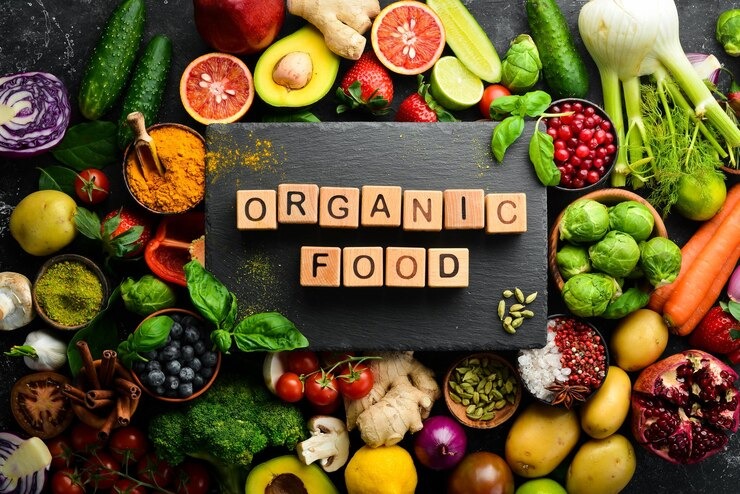
In today’s fast-paced world, where convenience often takes priority, the quality of the food we consume can sometimes take a backseat. However, as more people seek healthier lifestyles, the demand for organic food has grown exponentially. But what makes organic food so special? Why should you consider adding it to your diet?
In this blog, we’ll explore the health benefits of eating organic and why it’s a choice that not only benefits your body but also supports a healthier planet.
What Does “Organic” Really Mean?
Organic food refers to crops and livestock produced without the use of synthetic pesticides, fertilizers, genetically modified organisms (GMOs), or artificial additives. Instead, organic farming emphasizes sustainable practices, natural pest control, and soil health to ensure food is grown as nature intended.
For animal products, “organic” means livestock is raised on organic feed, without the use of growth hormones or antibiotics, and with access to the outdoors.
Top Health Benefits of Eating Organic
1. Fewer Harmful Chemicals
One of the most significant benefits of organic food is its reduced exposure to harmful chemicals. Conventional farming often uses synthetic pesticides and herbicides, some of which can leave residues on produce. Studies suggest that prolonged exposure to these chemicals may contribute to health issues, including hormone disruption and certain cancers.
Organic farming avoids these chemicals, providing you with cleaner, safer food options.
2. More Nutrients
Research has shown that organic foods often contain higher levels of certain nutrients compared to conventionally grown counterparts. For example, organic fruits and vegetables are known to have higher levels of antioxidants, which help fight inflammation and reduce the risk of chronic diseases such as heart disease and cancer.
Similarly, organic dairy and meat products often contain more omega-3 fatty acids, which are essential for brain and heart health.
3. No GMOs
Genetically modified organisms (GMOs) are plants or animals whose DNA has been altered in ways that do not occur naturally. While the long-term health effects of consuming GMOs are still being studied, many people choose organic foods to avoid the uncertainty surrounding GMOs. Organic certification ensures that food is free of GMOs, giving you peace of mind.
4. Improved Digestive Health
Organic farming practices promote healthier soil, which leads to crops that are richer in beneficial bacteria. These natural probiotics can improve gut health, aiding in better digestion and overall well-being.
Additionally, organic foods often have less exposure to synthetic additives, which can irritate the digestive system.
5. Lower Risk of Antibiotic Resistance
In conventional farming, animals are often given antibiotics to promote growth and prevent disease in crowded conditions. Overuse of antibiotics can lead to antibiotic-resistant bacteria, posing serious health risks to humans.
Organic farming prohibits the use of routine antibiotics, reducing the risk of antibiotic resistance and ensuring safer meat and dairy products.
6. Better for Allergies and Sensitivities
Many people with food allergies or sensitivities find relief when switching to organic products. The absence of artificial preservatives, flavorings, and chemicals can reduce allergic reactions and improve overall tolerance to foods.
Beyond Health: Organic Food and the Environment
While the health benefits of organic food are undeniable, it’s also important to recognize its environmental advantages. Organic farming:
- Promotes Biodiversity: Encourages the growth of diverse crops and ecosystems.
- Protects Soil Health: Avoids harmful chemicals that deplete soil nutrients.
- Reduces Pollution: Prevents runoff of synthetic fertilizers and pesticides into water sources.
When you choose organic, you’re not just prioritizing your health—you’re contributing to a healthier planet.
Tips for Transitioning to Organic Food
Switching to an organic diet doesn’t have to be overwhelming. Here are a few tips to get started:
- Start Small: Begin by replacing a few items, such as fruits and vegetables, with organic options.
- Know the Dirty Dozen: Focus on buying organic versions of the most pesticide-contaminated produce, such as strawberries, spinach, and apples.
- Shop Local: Farmers’ markets are a great place to find affordable, fresh organic produce.
- Read Labels: Look for certified organic labels to ensure the product meets organic standards.
Experience the Organic Difference
Eating organic isn’t just a trend—it’s a commitment to better health, more flavorful food, and a sustainable future. By choosing organic, you’re making a positive impact on your body, your community, and the environment.
Ready to experience the difference? Start incorporating organic foods into your meals and feel the benefits for yourself. Because when it comes to your health, every bite matters.
Discover the Goodness of Organic Dining
At yummies lounge, we take pride in serving dishes made from fresh, organic ingredients grown right on our farm. Visit us for a farm-to-table experience that’s as good for your health as it is for your taste buds.
